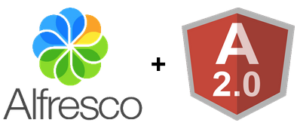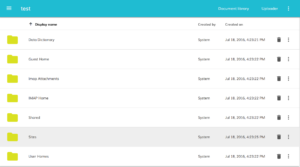 In 2009 I wrote a blog post called “Alfresco User Interface: What are my options?” because people frequently asked for recommendations around that and they still do. Then, in 2010 at the very first Alfresco DevCon, I gave a talk called “Alfresco from an agile framework perspective“. My talk summarized how painful it was to build custom apps on Alfresco by building one simple app twice–once using Share and once using Django–and then comparing the effort it took. Django won, hands down, in terms of level-of-effort and lines of code.
In 2009 I wrote a blog post called “Alfresco User Interface: What are my options?” because people frequently asked for recommendations around that and they still do. Then, in 2010 at the very first Alfresco DevCon, I gave a talk called “Alfresco from an agile framework perspective“. My talk summarized how painful it was to build custom apps on Alfresco by building one simple app twice–once using Share and once using Django–and then comparing the effort it took. Django won, hands down, in terms of level-of-effort and lines of code.
Share was fairly new at the time, and it has improved a lot since 2010 in terms of ease-of-customization. In fact, a few of us met with Alfresco engineering at the conference to give feedback about the Share developer experience and Alfresco listened. The next release of Share had improved extension points. It became much easier to extend or override pieces of Share without massive copying-and-pasting of Alfresco’s code.
But there was another aspect of my talk, which boils down to this: If you are trying to appeal to developers, why are you asking us to learn a new framework? There are already frameworks out there that are extremely popular, have all sorts of tooling, and are well-documented. Use what you want to build Alfresco Share, but what can you do to make it easier for developers to build content-centric applications on Alfresco using tools we already know?
Fast-forward to BeeCon, the community-led Alfresco conference held in Brussels back in April of this year. During that conference, Alfresco announced that it was doing something about this problem: They would create libraries and components to help people create custom apps on top of the platform external to Share. Some of these will be framework agnostic. But after looking at the frameworks out there they realized they cannot deny the popularity of AngularJS, so they also want to provide customizable components that Angular developers can use.
About two weeks ago, we got our first glimpse of what this really means. Alfresco made its alfresco-ng2-components GitHub repo public followed closely by a live streamed hangout where they discussed the vision for the components (YouTube link).
Definitely clone the repo, try it out yourself, and watch that video for context. But let me try to summarize what it means for you…
What is happening to Alfresco Share, Aikau, and Surf?
Alfresco Share is the shipping web client. It is built on top of Aikau and a lower-level framework called Surf. If Alfresco is getting behind Angular, are these going away? No. Both John Newton, Alfresco’s co-founder, and John Sotiropoulos, Alfresco’s new VP of Applications, were emphatic on that point. There are no immediate plans to make any significant changes to the direction of Alfresco Share, Aikau, or Surf. Many people have customized Share–those customizations should remain safe. Plus, a lot of people use Share out-of-the-box. Alfresco still needs a web client and they are their own biggest fans when it comes to Aikau and Surf.
I am customizing Share right now. Should I stop?
No, these components aren’t going to affect you. If you have no reason to build a custom front-end on top of Alfresco, you can safely ignore this announcement. However, if you are customizing Share because you thought it would be easier than writing your own custom application, and your customizations are so significant, that it feels like you are basically re-building an application from the ground-up, with little or no re-use from what Share offers, you may want to keep an eye on this. These components will give you a jumpstart on what otherwise would have been a from-scratch effort.
What exactly is shipping right now?
Alfresco is making an initial set of components available that includes:
- Login
- Document list
- Document viewer
- Datatable
- Search
- Uploader
In addition to the components, Alfresco offers a Yeoman generator to help you bootstrap an Angular2 application that makes use of one or more of these components.
I am writing a custom front-end using Angular right now. Should I stop?
Alfresco is shipping Angular components that can be used to build custom apps on top of Alfresco. And you are doing the same thing. It would seem like you might want to stop and leverage the new components. Before you do that, you need to be aware of two very important caveats.
First, Alfresco is using Angular2 which has very significant differences with Angular. And Angular2 is still shipping as a release candidate. Depending on your appetite for refactoring and risk, you may or may not want to make the switch to Angular2 just yet. Still, I think it was smart for Alfresco to choose Angular2 to avoid making that move later.
The second thing is that the new Alfresco Angular2 components rely on significant enhancements to the Alfresco REST API. Those enhancements are not in any stable version of the product. They are only available starting with 201606 EA (Early Access) release, which includes 5.2.a of the Alfresco platform. There is no way to know when Alfresco 5.2 Community Edition will go to a GA (Generally Available, aka “stable”) release. Which means we also do not know when 5.2 Enterprise Edition will ship.
You should not run any Early Access release of Community Edition in production. Therefore, if you need to be in production any time soon, you will not be able to leverage these components.
This second caveat has caused a fair amount of grumbling amongst the community. There has been some talk about back-porting the new REST API to a stable Alfresco release, but, unfortunately, this cannot be done without changes to the core.
People have been developing custom front-ends on top of Alfresco using Angular and other frameworks for years without making deep changes to the core product. Alfresco didn’t have to do it in this case, but they chose to, because they wanted to clean up the API simultaneously. Basically they chose the “rip the bandage fast” approach, which I understand. However, the impact of this decision is that it will be many, many months before real world feedback on these components makes it into the shipping code. Hopefully, enough people will still be motivated enough to try them out with the EA release.
I want to try the new components, how do I get started?
First, you’ll need a running version of 5.2.a (201606-EA) with CORS enabled. I forked the gui81/alfresco Docker image and upgraded it to 5.2.a with CORS enabled and pushed the result to Docker Hub if you want to use it. Or you can download it from the wiki or Sourceforge.
The GitHub repo has a good readme, so take a look at that. I’m not going to duplicate it here, so follow those directions.
I had good luck installing the Yeoman generator and then just running “yo ng2-alfresco-app”. You’ll get a chance to specify which components you want installed into your new app–I had problems unless I selected all of them.
Yeoman generates the app. NPM is used to run it locally for development purposes. To fire it up, just run “npm start”. Once up, I was able to use the sample app to work with the back-end Alfresco repository, as shown here (click to enlarge):
It’s probably important to note that what you see running is basically a sample app or sandbox for these components. It’s up to you to write a functional app with all of the features your users need. You’ll incorporate and customize these components as part of your own development effort. You can check the documentation to learn more about how to customize each component.
Alfresco wants your feedback on these components. Don’t be afraid to report issues or submit pull requests on the GitHub repo.
Summary
I am excited to see this from Alfresco. It is too early to use these in production, but once the new REST changes ship in a GA product, you should definitely consider this as a way to jumpstart your custom apps, even if you don’t use Angular. If you’ve been looking for a way to get involved in the Alfresco community, trying these out and giving your feedback is an excellent opportunity to do so.


“Alfresco embraces AngularJS: Now what?” https://t.co/iUV91x0aA7 #tech #feedly
RT @yann361: “Alfresco embraces AngularJS: Now what?” https://t.co/iUV91x0aA7 #tech #feedly
Why did alfresco choose angular 2 over react. It seems the react community is much more vibrant.
The screencast I referenced where John Sotiropoulos reviews his slides covers some of their reasoning.
I probably should have emphasized this more in the post, but one of the things they are distributing is a JavaScript library. Their Angular components call that. So if you want to use React or Backbone or whatever, you can still take advantage of that library.
Regardless of what they pick, it won’t be the crowd favorite forever, and they realize that. By shipping a generic JavaScript library as well as components specific to Angular2 they hope to hit a majority of front-end devs.
RT @RedTreeECM: Interesting read by @jeffpotts01 https://t.co/oVZTgvHdIk Alfresco embraces AngularJS: Now what? #alfresco #ecm #angular2
Interesting read by @jeffpotts01 https://t.co/oVZTgvHdIk Alfresco embraces AngularJS: Now what? #alfresco #ecm #angular2
Thanks for the article Jeff. To be clear the updated REST apis precede the AngularJS components. It wasn’t “simultaneous”. Improving the Alfresco Rest apis has been ongoing for several years. Gavin and Ole have talked about this in the past. Jan spoke about them at Beecon.
The decision was made for the AngularJS components to use the new rest apis, rather than the other way around (ie. creating new rest apis for the AngularJS component).
You could use your favorite language to call the REST apis; AngularJS isn’t required. For example, a pure javascript library was also announced: https://github.com/Alfresco/alfresco-js-api
Having said all that, its great that the community is now interested in those apis and the AngularJS components have generated enthusiasm for them. The team working on new APIs have been extremely keen to get early community feedback and look forward to a production release with them in.
RT @yann361: “Alfresco embraces AngularJS: Now what?” https://t.co/iUV91x0aA7 #tech #feedly
RT @RedTreeECM: Interesting read by @jeffpotts01 https://t.co/oVZTgvHdIk Alfresco embraces AngularJS: Now what? #alfresco #ecm #angular2
It is my understanding that the AngularJS components rely on REST API changes that are not available in any GA release. Is that not the case?
You are right Jeff, there is currently no GA Enterprise release with the new Rest APIs in. (Correct on 1st August 2016)
Nice article! One thing to note, that you might want to change in your article to keep it up to date:
Old Angular is AngularJs (that is, 1.x). New Angular (previously, Angular 2) is just Angular.
For a follow up on this: http://angularjs.blogspot.com/2016/12/ok-let-me-explain-its-going-to-be.html
Thanks for reading and for the suggestion, but it is usually good enough for me that things are current when written. With over a thousand posts, if I had to go back and update old posts I wouldn’t have time to do anything else. 🙂